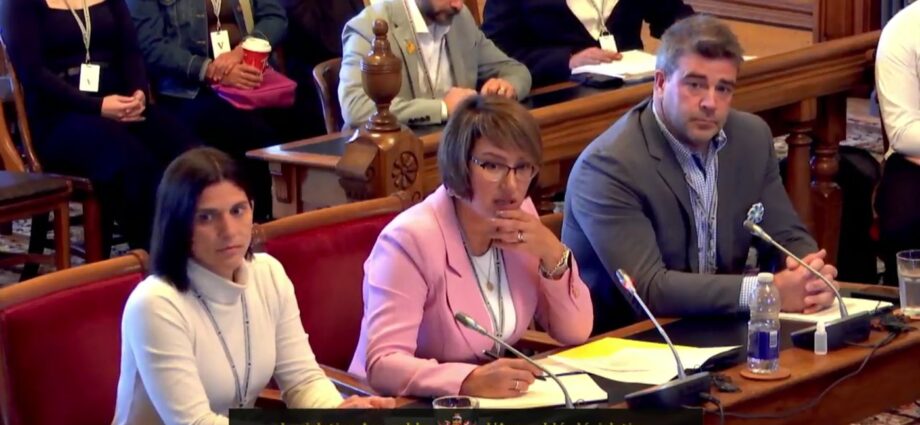
By John Chilibeck, Local Journalism Initiative Reporter, The Daily Gleaner
September 27, 2023
New Brunswick’s six Wolastoqey communities are in talks with two nuclear firms in Saint John and NB Power to see if they should make the same kind of deal their Mi’kmaq counterparts just signed.
Officials with the organization the Wolastoqey Nation in New Brunswick told the standing committee on climate change on Tuesday they haven’t closed the door on the development of small nuclear reactors at Point Lepreau.
They’re just not sure if it’s worth risking their money by investing, as seven Mi’kmaq announced they would the day before. Although most of the details are confidential, the Indigenous communities along the north shore and eastern coast of the province are getting $3 million worth of shares from ARC and Moltex, the two developers, once a future valuation process goes through.
“At this stage, we are trying to gather as much information, understanding that both technologies proposed are highly innovative and very much in the research and development stage,” said Ryan Dunbar, an engineer who owns Soar and a member of Pilick (Kingsclear First Nation). “We are taking a very thoughtful and considerate process to understand the potential risks that are present as well the political implications.”
“But we do appreciate that it will in all likelihood form the backbone of much of the energy in New Brunswick.”
Nuclear controversy
The Wolastoq are in an uncomfortable position. Chief Hugh Akagi of the Peskotomuhkati Nation at Skutik, whose traditional land includes southwestern New Brunswick, Passamaquoddy, and parts of Maine, is deeply opposed to more nuclear power, fearing the waste products that will last for countless generations.
His Indigenous community considers Point Lepreau, near Saint John, part of its territory, but the Wolastoqey Nation has an overlapping claim in the same area.
The communities along the river, whose people are named after the waterway itself, are still angry that the province dammed their river more than 50 years ago for hydroelectric projects.
All six of the First Nations voted against the renewal of the massive Mactaquac Generating Station, advice that NB Power and the provincial government ignored.
Dam opposed by First Nations
Darrah Beaver, executive director of the Wolastoqey Nation, told the politicians her people supported measures to create green, renewable energy that would help end global warming. But they don’t consider big dams, like Mactaquac and Tobique Narrows, to be clean energy.
“These dams have flooded our communities and eroded the parts of others, submerged sacred prayer sites and burial grounds, flooded some of our best and most accessible fiddlehead and sweetgrass areas, created barriers for our navigation, blocked fish passage and destroyed habits, contributing to the decline of species like Atlantic salmon and striped bass,” she said. “They’ve killed migrating fish through the turbines and spillways, and helped spread non-native fish like smallmouth bass and muskellunge.”
“They’ve created warmer surface water conditions where nutrients are overloaded, causing algae blooms that are toxic to humans and animal life.”
Beaver said smaller hydro projects could be a good idea if they were done with “thought, care and investment in time and relationships,” such as through proper collaboration with First Nations communities.
She said first and foremost, the Indigenous communities should be involved in the development of all energy projects in the province, from start to beginning, and equal partners in decision-making.
The relationship with government
Liberal MLA Guy Arseneault wanted to know what the negotiation process had been like with the Progressive Conservative government on energy projects.
Beaver replied that the Tories had centralized all discussions through the Department of Aboriginal Affairs, which she described as a slow process that didn’t allow Indigenous representatives to form good relationships with officials from different government departments.
Gillian Paul, the group’s legal adviser, said negotiations between her side and the provincial government broke off when the Wolastoqey leaders filed a title claim for more than half of New Brunswick in 2020.
“For us, negotiations need to happen as early as possible in the process. Oftentimes what we find is when we’re consulted, it’s really at the end of the project, when it seems like the decision on the project has already been made and consultation is really just a blowing off steam for First Nations, and another hurtle or check box in the process to get project approval.”
Gary Crossman, the environment minister, balked at that characterization.
“I stand to be corrected, but there are meetings every Friday with the chiefs, isn’t there, with the premier?” he asked.
Beaver said there were no such meetings with Premier Blaine Higgs.
“I understand there are meetings on a regular basis,” Crossman said hurriedly. “For information sharing and keeping us up to speed.”
A wind alternative
The minister then asked what alternatives the Wolastoqey Nation had for replacing the Mactaquac dam, just west of Fredericton, which is the only generator in the province that can restart the electrical grid from a complete blackout.
“The replacement of 660 megawatts is a complicated one,” Dunbar said. “Each one of our communities is pursuing clean energy projects, after the recent request for an expression of interest from NB Power, as well as some actual projects that are happening on the ground right now.”
Neqotkuk (Tobique First Nation) has already built 50 mw of wind energy near Saint John.
But Dunbar said such projects would only work if they generate revenues for the First Nations.
Subscribe to our newsletter.
“Our communities are in turmoil and are trying to replace own-source revenues that have recently been lost,” he said, referring to the nearly $50 million in annual tax agreements with the Wolastoqey First Nations that the Higgs government did not renew in January after being in place for about 30 years.


